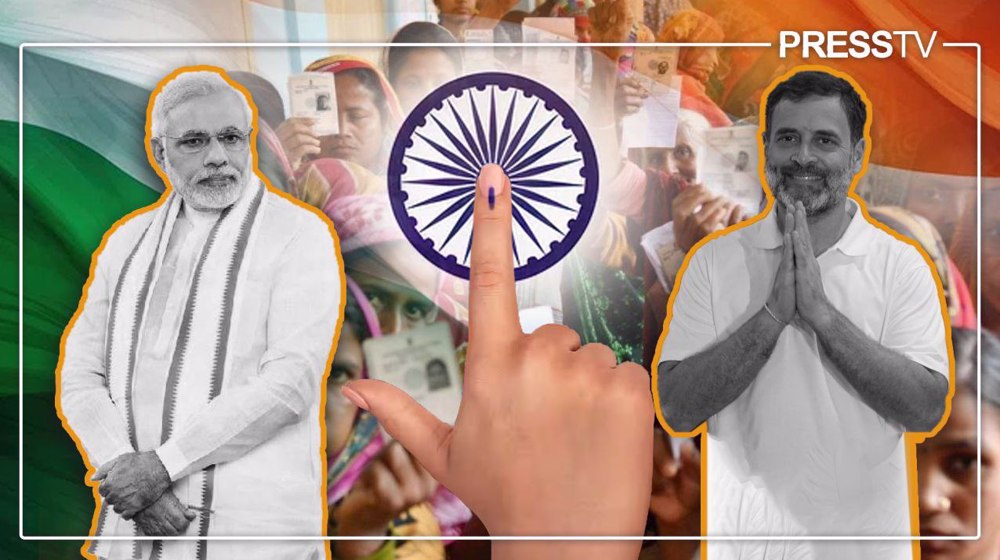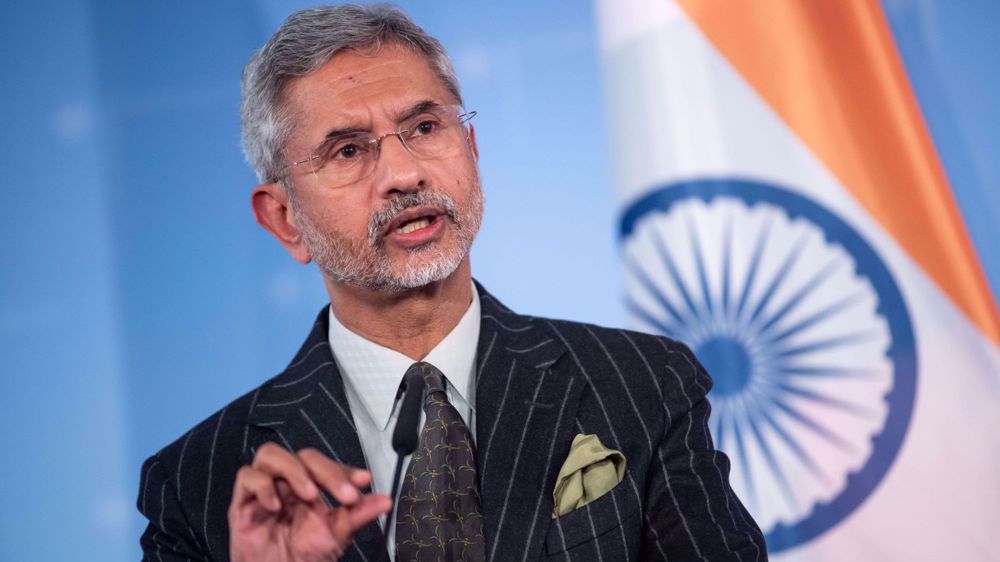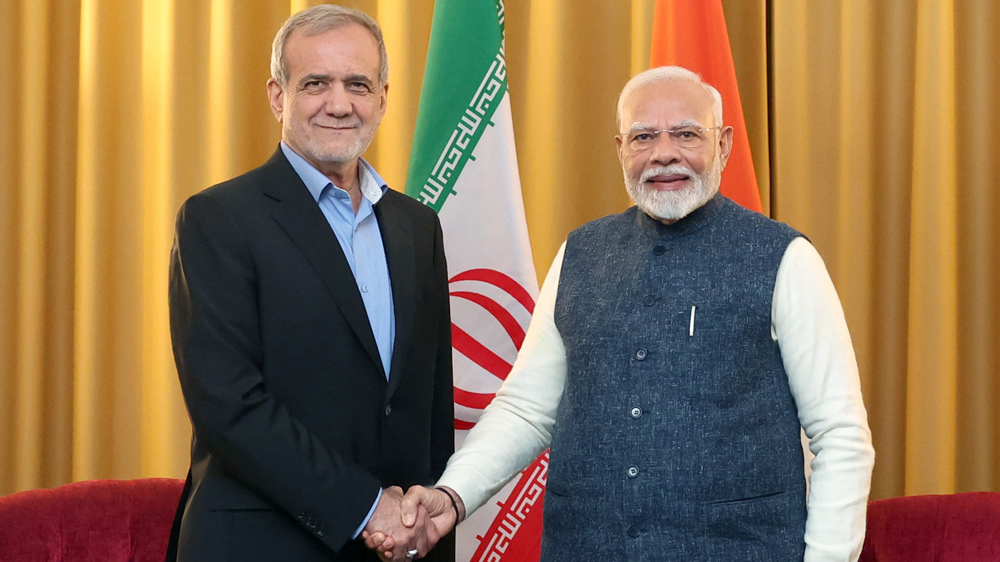India elections: As vote count gets underway, Modi’s BJP looks set to retain power
By Mehdi Moosvi
The world’s largest, seven-phase general election in India has finally concluded and the vote count is currently underway with all indications that the ruling party will retain power.
The vote count began early on Tuesday after the marathon election that began on April 19 and ended on Saturday. According to exit polls, Prime Minister Narendra Modi’s Bharatiya Janata Party (BJP), which has been in power since 2014, is likely to retain power this time.
However, unlike in the previous election, the nationalist party might fall short of an absolute majority in the country’s parliament as the united opposition led by the Indian National Congress fights on.
The performance of the opposition has surprised many political pundits who had predicted a landslide victory for the BJP. Many prominent BJP leaders have been trailing in key constituencies.
According to the latest reports, the BJP is leading in 283 seats while the united opposition, which includes the Congress is ahead in 219 seats out of the total 543 seats in the parliament.
Approximately 970 million eligible voters, constituting over 10% of the global population, had the opportunity to choose a new parliament for 543 constituencies across the nation.
The likely return of the ruling party, which has been accused of discriminatory policies against the minority Muslim community, has compounded the fears of the community, observers say.
What lies ahead after vote count
Modi, who has been the country’s unchallenged ruler since 2014, vigorously campaigned for his party and called upon the voters to turn out in large numbers and vote for his party.
“Together, let's make our democracy more vibrant and participative,” he was quoted as saying when the polls opened in April, a statement that many pundits took with a pinch of salt.
The party that gets the majority in the parliament or the parties who stitch together an alliance are expected to form a new government by mid-June following the tallying of votes on June 4.
This election was mainly a contest between the National Democratic Alliance (NDA), headed by the ruling Bharatiya Janata Party (BJP) led by Modi, and the Indian National Developmental Inclusive Alliance (INDIA), led by the main opposition Indian National Congress party.
Along with fiery speeches and big fat election rallies, incumbent Modi and the main face of the Congress party, Rahul Gandhi, the scion of the family that ruled New Delhi for more than half a century, made all-out efforts to woo voters and bring each other down politically.
The election has been described as the most significant in India's history, with over 8,300 candidates vying for office. If Modi emerged victorious, he would become only the second Indian leader to secure a third consecutive term after Jawaharlal Nehru, the nation's first prime minister.
Given the exit polls, there is a likelihood that Modi will retain his chair for the third time – either the BJP will get the absolute majority or will be able to stitch together an alliance of like-minded forces.
BJP, Modi in the driving seat
In recent weeks, almost all exit polls have favored a Modi landslide. Media outlets have quoted pre-election surveys that anticipate a comfortable win for Modi.
Nikita Jain, an independent journalist based in New Delhi, who extensively covered Indian elections, believes there is “little understanding of India” in media outlets as their poll data sources are inaccurate.
“They hardly understand the caste and religious dynamics here. Most of these people get the poll data from Indian TV news (which is largely funded by the BJP) and it’s as unreliable as the boy who cried wolf,” Jain said in an interview with the Press TV website.
Rights groups and minority activists say that if Modi is re-elected, it would only mean more trouble for the 200 million Muslim minorities in the country, as his policies are not seen in favor of them.
“Since the last elections (which were held in 2019), a lot has changed. This time, I can sense there is anxiety on what will happen if the NDA government comes to power,” Jain said.
This time, however, a stronger opposition has mounted a challenge to Modi, led by Gandhi, who calls him a “dictator” because of his government’s policies and crackdown against political opponents.
“Rahul Gandhi has definitely gathered some eyeballs” “since the last elections”, said Jain. “But the problem is the damage is too much and even if people are slowly changing sentiments about him, it is difficult for him to make that mark,” stated Jain.
Ghazala Ahmad, a multimedia journalist who extensively covers hate crimes, communalism and discrimination against Muslims and minorities in India, and was on the ground throughout the elections, noticed that the people are seeking a change in the government.
“People are done with the incumbent government. The only option they see is to vote the BJP out, for that, they’re exercising their right because they no longer want to be ruled by the government like the BJP, which according to them has not done anything in the last decade,” she told the Press TV website.
“I personally met BJP workers while reporting, and they told me off record that they don’t want BJP to be elected because the party has not even done anything for them as well,” she added.
Critics believe if Modi wins his rare third term, it would be probably through electoral fraud, which the BJP has been accused of during previous elections.
“They’re controlling the institutions, including the election commission and the media. There are cases revealed where people have been casting multiple votes for the BJP,” said Ghazala, who is puzzled about the upcoming June 4 results.
Meanwhile, Modi’s supporters, who mostly belong to the majority Hindu community, are confident that the ruling party will win the election and Modi will become the Prime Minister for the third time.
“BJP is the only party that works for the people of India and PM Modi has put India on the global map through his domestic and foreign policies. He deserves to win,” Rakesh Ghansela, a BJP supporter from New Delhi told the Press TV website.
Voter’s voices, fears, concerns
Pre-poll surveys showed that voters were increasingly worried about unemployment, the rise in food prices, and an overall sentiment that only a small portion of Indians have benefited during the BJP rule, making the contest appear closer than initially anticipated.
Raj Kumar, a low-income farmer in his thirties hailing from Balrampur district in the northern state of Uttar Pradesh (UP), the country’s most populated state, voted for the opposition INDIA alliance owing to the rising unemployment and cost of living he bore during the ruling government.
“People are fed up with the rising cost of living, there are no sources of income for the people living in villages, the reason why people are moving towards cities in search of their daily bread,” Kumar told the Press TV website.
“The new government should work towards making farmers self-reliant and provide them with such facilities that they need not be buried under the burden of loans,” he added.
India is considered a young nation, owing to more than 50% of its population below the age of 25 and more than 65% below the age of 35. Only 40% of eligible 18-19-year-olds registered to vote, but marked a whopping 18.5 million first-time young voters enrolled to cast their ballots.
“First-time voters are enthusiastic and want change. There is a better understanding of politics, all thanks to social media, the youth is much more aware. Many of the youth know how important these elections are for the future,” said Jain.
As a first-time voter from UP’s capital Lucknow, Yusha Abbas, a 22-year-old university student, considered rising unemployment, rural and urban development as major concerns.
“I voted for a change of government in India as the present government isn’t doing any development work and is only involved in politics of religion and hate,” Abbas told the Press TV website.
“Hate has spread a lot in the minds of people, especially for Muslims in the period of BJP.”
Meanwhile, Sheikh Aadil, a 28-year-old businessman from Srinagar, Kashmir, never participated in elections before even after being eligible at the age of 18 but voted this time to bring someone who can fix law and order in Kashmir and work towards the restoration of statehood in Kashmir.
“I don’t think that India is heading towards healthy democracy because of the countless hate speeches and propaganda against the particular community,” Aadil told the Press TV website.
“Choosing a favorite leader in our society is like choosing from the given options. All we can do is compare all the leaders and choose the least corrupt,” he said.
For a die-hard Modi fan, Nishant Sharma, a 35-year-old voter from New Delhi who works in the private sector, Modi was his only choice as he believes that Modi provided security, liveliness, roads, better medical facilities, basic needs on the doorstep, and digitization.
“Narendra Modi leads the generation along with the country in a way that throughout 35 years of my life, I haven't seen such a man who has always inculcated through new ideas and sudden ventures,” Sharma, who looks forward to a Modi win, told the Press TV website.
US fighter aircraft shot down ‘in friendly fire’ amid aggression on Yemen
Yemeni FM: Israel’s sponsors accountable for ongoing aggression on Sana’a
Eight Palestinians killed as Israel attacks Gaza school, hospitals
VIDEO | Rome, Milan host new protests in solidarity with Palestinians
Dec. 21: ‘Axis of Resistance’ operations against Israeli occupation
Spain jurists demand ties with Israel ties be cut
VIDEO | Press TV's news headlines
VIDEO | Iran honors top Science Olympiad medalists










 This makes it easy to access the Press TV website
This makes it easy to access the Press TV website